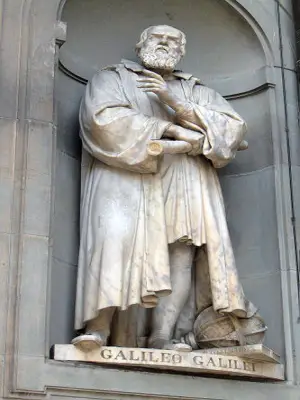On January 8, 1642, the world said goodbye to one of its greatest minds—Galileo Galilei. At the age of 78, Galileo was blind and ill. He spent the last eight years of his life under house arrest. This was a surprising fate for a man who changed the course of science forever.
Why House Arrest?
Galileo’s troubles began with his revolutionary ideas. He believed that the Earth revolved around the Sun, not the other way around. This belief contradicted the teachings of the Catholic Church, which held a geocentric view of the universe. The Church interpreted certain Biblical passages literally, leading to a conflict between Galileo and the Church authorities.
In 1616, the Church warned Galileo to abandon his views. However, he continued to support the Copernican theory. In 1633, he faced a trial by the Inquisition. Found guilty of heresy, he was sentenced to house arrest for the rest of his life. It wasn’t until 1992 that the Church officially pardoned him and apologized for its actions.

Galileo’s Remarkable Achievements
Despite his confinement, Galileo made significant contributions to science. One of his most famous achievements occurred in 1610 when he observed Jupiter’s moons. Initially, he called them “three fixed stars.” However, as he continued to observe, he realized they were moons orbiting Jupiter, not Earth. This discovery provided strong evidence against the geocentric model.
Galileo is credited with many groundbreaking achievements:
- Pioneering the Scientific Method: He emphasized experimentation and observation.
- Building the First High-Powered Telescope: This allowed him to explore the heavens like never before.
- Discovering the Phases of Venus: His observations supported the heliocentric theory.
- Studying Sunspots: He documented these dark spots on the Sun’s surface.
- Developing Key Ideas in Physics: He explored motion, gravity, and inertia.
A Timeline of Great Minds
Galileo’s life intersected with other great thinkers. He was born in 1564, the same year Michelangelo died. Interestingly, he passed away just days before Isaac Newton was born in 1643. Here’s a quick look at their ages at death:
- Michelangelo: Died at 88
- Galileo: Died at 78
- Shakespeare: Died at 52
- Newton: Lived to 84
This timeline shows how these great minds influenced each other across generations.
A Famous Quote
One of Galileo’s most famous quotes is:
“Mathematics is the language in which God wrote the universe.”
This statement reflects his belief in the power of mathematics to explain the natural world. He used math to formulate laws of motion and other scientific principles.
The Birth of Modern Science
Galileo is often called the father of modern science. Unlike many of his contemporaries, he did not just theorize. He conducted experiments and meticulously recorded his findings. He established standards for length and time, allowing others to replicate his experiments. This approach laid the groundwork for the scientific method we use today.
Stargazing Tonight!
Winter nights can be perfect for stargazing. The early darkness provides an excellent opportunity to observe the night sky. Before heading outside, check what celestial events are happening. Websites like NASA’s JPL offer videos and guides for stargazers.
You don’t need a telescope to enjoy the stars. A good pair of binoculars can enhance your experience. Look for constellations, planets, and even the Moon.
Try Some Experiments
Inspired by Galileo? You can conduct your own experiments at home! Here are a few ideas:
- Lunar Observation: Track the Moon’s phases over a month. Note how its shape changes each night.
- Falling Objects: Drop different items from the same height. Observe which hits the ground first. This can help you understand gravity.
- Projectile Motion: Use a small ball to explore how angles affect distance. Throw it at different angles and measure how far it goes.
Explore Virtual Experiments
If you prefer a digital approach, there are many interactive demos available online. Websites offer simulations on topics like:
- Falling Objects: See how gravity affects different weights.
- Projectiles: Experiment with angles and speeds.
- Inclined Planes: Understand how slopes affect motion.
- Pendulums: Discover how length and weight influence swing time.
These resources can deepen your understanding of Galileo’s principles and the laws of physics.
Conclusion: Remembering Galileo Galilei
Galileo Galilei’s legacy is one of courage, curiosity, and groundbreaking discovery. His life story is a testament to the struggle between scientific inquiry and dogmatic belief. Despite facing immense pressure from the Church, he remained steadfast in his pursuit of truth. His discoveries not only changed our understanding of the universe but also laid the foundation for modern science.
As we reflect on his contributions, we are reminded of the importance of questioning established beliefs and seeking knowledge through observation and experimentation. Galileo’s work encourages us to embrace curiosity and to explore the world around us, just as he did.
So, as you gaze at the stars tonight, think of Galileo. Consider the vastness of the universe and the mysteries it holds. Remember that the pursuit of knowledge is a journey that continues to this day. Whether through stargazing, conducting experiments, or simply asking questions, we can all honor Galileo’s legacy by fostering a spirit of inquiry and wonder.
In a world where science and technology continue to evolve, let us carry forward the lessons learned from Galileo’s life. His story inspires us to challenge the status quo, to explore the unknown, and to appreciate the beauty of the universe through the lens of science.
Join the Conversation
What are your thoughts on Galileo’s contributions to science? Have you ever conducted your own experiments or stargazed? Share your experiences in the comments below! Let’s celebrate the spirit of inquiry that Galileo embodied and continue to explore the wonders of our universe together.